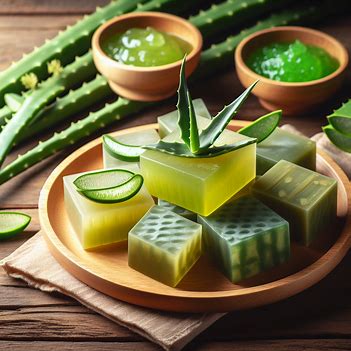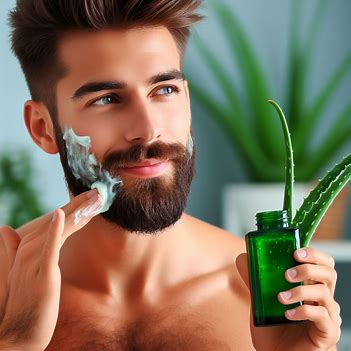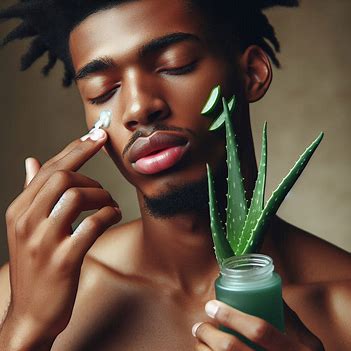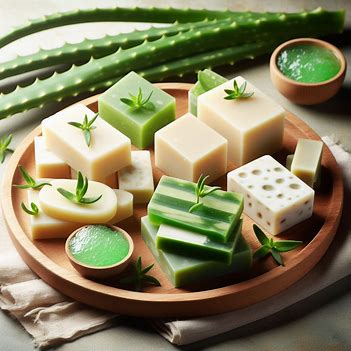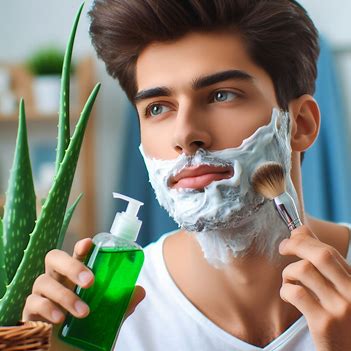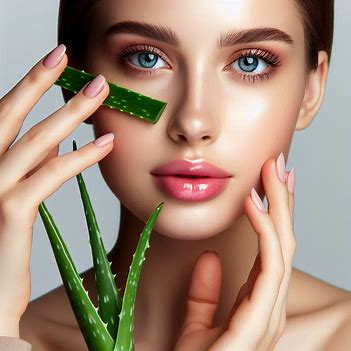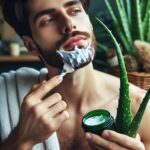This is a conversation with holistic dermatologist Dr. May0 Puri about whether aloe vera is comedogenic (pore-clogging).
She explains that pure aloe gel is generally non-comedogenic.
However, some commercial aloe products may contain potentially pore-clogging additives.
Her expertise provides clarity on aloe’s skin benefits versus risks for acne-prone individuals.
We’ve all heard about the amazing benefits of aloe vera for skin – its soothing, moisturizing, and healing properties.
But there’s been a lot of debate lately about whether this succulent plant darling is actually good for acne-prone skin.
Some say aloe could actually clog pores and cause breakouts, while others swear by its antimicrobial and anti-inflammatory effects.
To get to the bottom of it all, I sat down with leading holistic dermatologist, Dr. Mayo Puri.
With over 15 years’ experience in natural and botanical skin remedies, Dr. Puri is my go-to guru for all things green beauty.
So is aloe vera really comedogenic and acne-causing? Here’s what the expert has to say:
Click Here to View our Pore Clogging Ingredient Checker
Q: What is the definition of a comedogenic ingredient?
A: Excellent question to start with!
A comedogenic ingredient is any substance that has the potential to clog pores.
Essentially, comedogenic ingredients are pore-clogging culprits.
Skin care regimes often involve selecting ingredients that are gentle on the skin to avoid clogged pores. However, some skincare ingredients are more prone to getting trapped in pores and creating a blockage that allows bacteria and oils to build up.
Q: How is comedogenicity measured or rated for ingredients?
A: Skin care ingredients are assigned a comedogenic rating from 0 to 5:
0 – Will not clog pores
1 – Slightly comedogenic
2 – Moderately comedogenic
3 – Considerably comedogenic
4 – Highly comedogenic
5 – Highest risk of clogged pores
Ratings of 0-2 are generally considered non-comedogenic and safe for acne-prone skin. 3 and above indicate the ingredient may pose issues for those with clogged pores.
Q: So, is aloe vera comedogenic?
A: Aloe vera typically receives a comedogenic rating of 0 or 1 – meaning it is considered non-comedogenic to only slightly comedogenic.
More specifically, the gel extracted from the inner leaf of the aloe vera plant is rated at a 0, while the whole leaf extract rates around a 1 on the comedogenicity scale.
So in its pure gel form, using an aloe vera moisturizer for oily skin poses little to no risk of clogging pores or contributing to blackheads and whiteheads.
This makes it a great option for acne-prone skin when used properly.
Wondering How to Use Aloe Vera Gel on Face at Night? Follow These Steps
Q: Are there different types or grades of aloe vera that differ in comedogenicity?
A: Absolutely, there are different types and grades of aloe vera products that can impact its comedogenicity rating.
When it comes to skin care, understanding the different types of aloe vera is crucial.
First up, we have good ol’ straight-from-the-plant aloe gel.
This inner leaf gel is considered the purest, most non-comedogenic form with that coveted rating of 0 on the comedogenic scale.
This is why aloe vera and skin care experts often recommend using pure aloe vera gel for oily skin.
However, many of the aloe products on the market contain “whole leaf” extracts.
While still fairly low on the comedogenic index scale, these extracts use more of the entire leaf which can introduce some additional components like anthraquinones that may be slightly more pore-clogging.
Then we have even more processed and concentrated aloe ingredients like decolorized or dehydrated powders and juices.
Depending on the extraction methods, these could potentially concentrate comedogenic ingredients and may rate higher on the scale.
But as with any ingredient, checking quality sources and exact formulations is key.
You can use a comedogenic ingredients checker to ensure the product is suitable for your skin.
Q: Does aloe vera clog pores when processed from its natural state?
A: Research suggests that aloe vera is non-comedogenic, but it’s essential to choose a high-quality product with minimal processing to minimize the risk of clogged pores.
When in doubt, check this list of comedogenic skin care products to ensure you’re making an informed decision.
As an expert, I always emphasize that fresh is best when it comes to minimizing comedogenicity.
Q: Does aloe’s comedogenicity change when processed from its natural state?
A: The way aloe vera is processed from its natural state can impact its potential to clog pores.
Let’s start with aloe straight from the plant.
In its purest, unprocessed form, aloe gel rates at a super low 0 on the comedogenic scale.
Basically, it gets an A+ for being non-comedogenic right from nature’s hands!
However, once aloe goes through certain processing methods, its comedogenicity can start to rise a little.
This is especially important for those with dry skin, as they may need to take extra precautions.
That’s not to say all processed aloe is heavily pore-clogging though!
Many quality, reputable brands use clean methods that preserve aloe’s benefits as much as possible. This makes it an excellent choice for those using aloe vera for acne-prone skin.
So if you are thinking, does aloe vera clog pores? The answer really depends on the processing methods used.
Q: What are the main properties in aloe that could potentially clog pores?
A: You raise an excellent question! Aloe vera benefits oily skin, but it’s crucial to choose a high-quality product to reap the advantages.
When it comes to aloe vera, there are a few key components we need to examine closely.
First up, let’s talk about the gel itself. On its own, aloe vera gel is low in comedogenic risk factors, making it great as a non comedogenic product.
However, the outer leaf portions and some specific compounds are where pore-clogging concerns could arise if not properly extracted.
One compound to be aware of is anthraquinones – these naturally occurring plant chemicals could potentially lead to irritation or congestion if too concentrated.
But here’s the good news – when extracted and formulated correctly, even a high-quality aloe vera face pack for oily skin should be free from concentrated anthraquinones, resins and any pore-clogging preservatives or add-ins.
Q: Are there any additives or preservatives often used with aloe that increase comedogenicity?
A: Excellent question!
While aloe itself is non-comedogenic, some common additives could negate those pore-friendly benefits.
For instance, if you use aloe vera for oily skin, you should be cautious when selecting aloe products.
Look for products that are labeled as suitable for oily skin.
By understanding what makes aloe vera good for oily skin, you can make informed decisions and enjoy the benefits of aloe while maintaining healthy, balanced skin.
One big category to watch out for are heavy, pore-clogging oils and butters. I’ve seen plenty of aloe products marketed as “natural” that are loaded up with other skin clogging ingredients.
Another red flag? Products utilizing synthetic thickening agents like carbomers or gums.
These ingredients create a heavy, sticky base that traps debris in pores.
I always recommend avoiding these unnecessary fillers when a pure, high-quality is naturally so smooth and spreadable.
Then we have preservatives – kind of a necessary evil to extend shelf-life.
But choosing the right ones is crucial.
Parabens are a no-go for me, as they can irritate and congest pores over time.
Same for formaldehyde-releasing preservatives that can be very irritating.
Q: Is pure, natural aloe considered safe for acne-prone skin?
A: Using aloe vera as part of your skincare routine can help reduce irritation and inflammation.
In fact, aloe vera for dry skin can be incredibly beneficial in providing long-lasting hydration and soothing dryness.
When it comes to acne-free skin care products, it’s essential to choose those that are gentle and effective.
Aloe vera for acne prone skin is a wonderful option, and I wholeheartedly recommend it for those struggling with acne.
In fact, aloe vera is one of my top picks for preventing and calming acne breakouts!
As we discussed earlier, aloe rates low on the comedogenicity scale when it’s extracted properly.
That means it has very little risk of actually clogging pores.
When it comes to skincare products, aloe is a natural and effective ingredient that can provide numerous benefits.
But aloe’s benefits go far beyond just being non-comedogenic.
This powerhouse plant contains naturally occurring compounds like antioxidants, enzymes, vitamins, and amino acids that can help nourish and protect skin cells.
The antioxidants help neutralize damage from free radicals that drive acne inflammation.
The polysaccharides provide intense moisturization without clogging pores, making it suitable for sensitive skin.
And the enzymes gently exfoliate while delivering pure hydration, making it beneficial for body care and hair care as well.
Many dermatologists also praise aloe’s antibacterial and anti-inflammatory properties that can help stop acne bacteria from spreading and calm existing breakouts quickly.
That’s why aloe makes such an effective spot treatment!
Q: How does aloe’s comedogenicity compare to other popular skincare ingredients?
A: Great question!
Let’s compare it to some other popular skincare ingredients:
- Coconut Oil: Coconut oil, though beloved for its moisturizing properties, is quite high on the comedogenicity scale with a rating of 4.
This means it’s more likely to clog pores and might not be the best choice for those prone to acne.
- Shea Butter: Shea butter sits in the middle with a comedogenic rating of around 2-3. It can be a hit or miss depending on your skin type.
It’s deeply moisturizing but may cause breakouts for some, especially if you have excess oil production.
- Jojoba Oil: Jojoba oil is another favorite, with a low comedogenic rating of 2.
It’s quite similar to the skin’s natural sebum, making it a good option for moisturizing without clogging pores.
- Argan Oil: Argan oil has a low comedogenic rating of 0-1, making it a safe bet for most skin types, including oily and acne-prone skin.
Its active ingredients penetrate deep into the skin, providing long-lasting hydration.
- Olive Oil: Olive oil has a moderate comedogenic rating of 2.
It’s rich and moisturizing but can be too heavy for some skin types, particularly if you’re prone to breakouts.
Be sure to exfoliate regularly to remove dead skin and other impurities.
Q: Do different forms of aloe (gel, juice, extract) have varying comedogenic ratings?
A: That’s an excellent question! Let’s break down each form:
- Aloe Vera Gel: This is the most common form used in skincare. It’s typically the inner part of the aloe leaf, pure and minimally processed.
Aloe vera gel retains its non-comedogenic rating of 0.
This form is especially good for calming irritated or sunburned skin, similar to how apple cider vinegar can be used as a natural remedy for skin issues.
- Aloe Vera Juice: Aloe vera juice is often made by crushing or grinding the entire leaf, followed by various purification and filtration processes.
The juice is slightly more diluted than the gel but still holds a non-comedogenic rating of 0.
In the United States, aloe vera products are widely available, making it easy to incorporate into your skincare routine.
- Aloe Vera Extract: Aloe extract is more concentrated and usually found in serums or creams.
Despite this concentration, the extract remains non-comedogenic.
It’s essential to debunk common myths about aloe vera when selecting the right product for your skin type.
When using aloe vera, always check for additional ingredients if you have sensitive or acne-prone skin.
Q: Are there any tips for using aloe properly to avoid potential pore-clogging?
A: Absolutely! Here are some tips to help you get the most out of your aloe vera skincare routine:
Choose High-Quality Products:
Opt for pure aloe vera gel or products with a high percentage of aloe vera as the main ingredient.
Patch Test New Products:
Before using a new aloe vera product all over your face, do a patch test on a small area of skin to check for any adverse reactions or sensitivities.
Apply Sparingly:
A little goes a long way with aloe vera gel. Apply a thin, even layer to your skin rather than slathering on thick coats. This helps prevent buildup and ensures your skin can breathe.
Layer Wisely:
If you’re using multiple skincare products, apply aloe vera gel before heavier creams or oils.
Use as Needed:
While aloe vera is generally safe for daily use, listen to your skin’s needs.
If you notice any signs of irritation or excess oiliness, reduce the frequency of application.
Stay Consistent:
Consistency is key when it comes to skincare.
Incorporate aloe vera into your routine regularly to reap its full benefits over time.
Q: Is aloe comedogenic for all skin types or just certain types?
A: Aloe vera is generally non-comedogenic, meaning it’s unlikely to clog pores, which makes it a great option for most skin types.
Whether you have oily, dry, sensitive, or combination skin, aloe vera can work without causing breakouts.
However, as with any skincare ingredient, individual reactions can vary.
It’s always a good idea to patch test new products and monitor how your skin responds.
Q: Are there any studies or research specifically examining aloe’s comedogenicity?
A: You know, there’s been quite a bit of interest in aloe vera’s effects on the skin.
But when it comes to specific studies on its comedogenicity, the research is a bit limited.
Most of the evidence we have comes from anecdotal experiences and observations in skincare.
However, aloe vera has been extensively studied for its anti-inflammatory, soothing, and hydrating properties, which are all factors that contribute to its reputation as a non-comedogenic ingredient.
While we might not have a ton of studies focusing solely on its comedogenicity, the consensus among skincare experts is that aloe vera is generally safe and unlikely to clog pores.
So there you have it folks. Dr. Puri has given us the full rundown on whether aloe vera is comedogenic and acne-causing or not.
Based on her expertise, it sounds like pure aloe gel from the plant itself is generally non-comedogenic and fine for most skin types.
But you’ll want to check ingredients lists carefully, since many commercial aloe products contain other potentially pore-clogging additives like thickeners and oils.
As always, everyone’s skin is different, so you may need to do a little experimentation to see how your complexion reacts to aloe.
But at least now you have the facts to make an informed decision!
What did you all think of Dr. Puri’s take? Have any of you used straight aloe gel as part of your skin care routine?
I’d love to hear your experiences and opinions in the comments below.

I’m a devoted organic skincare enthusiast, passionate about the natural, wholesome goodness that organic products bring to our skin.
Organic skincare isn’t just a hobby for me—it’s a lifestyle. Every product I use, recommend, and write about has been carefully chosen for its purity and effectiveness. Everything I write about is backed by scientific studies, dermatologists’ opinions, and user experiences.
I also excel at tackling skincare challenges with innovative, organic solutions.
